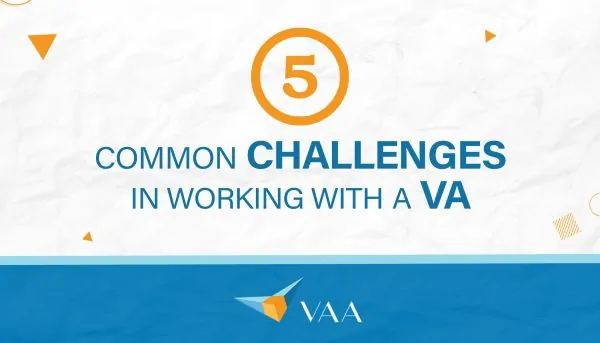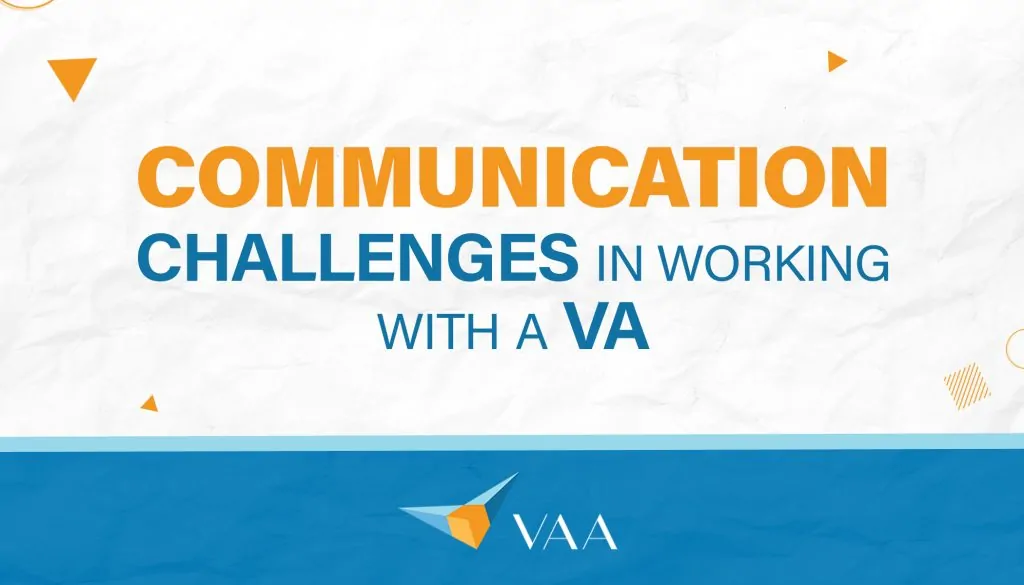

Covid-19 has wholly transformed the job market today, particularly for Virtual Assistants (VAs). More companies opted to hire offshore assistants to reduce the amount of overhead needed to run their businesses. Clients get to delegate some of their less important tasks, freeing up their time for more profitable pursuits while providing an opportunity for a bright administrative professional to earn a reasonable income.
Yet this can also be one of the most challenging moves a business person can take. What made it difficult?
Here are five common challenges in working with a VA that you should know before hiring one.

Many business relationships, especially VA/client ties, suffer from poor communication. With the communication's emphasis on technology rather than face-to-face interaction, the nature of remote employment might create extra communication barriers if not given attention. Misunderstanding is inevitable, especially if you and your VA do not use English as your primary language. Poor communication would also result in delegation, collaboration, and calibration issues. Unlike face-to-face interaction, text-based communication such as email, chat, and SMS lacks body language, tone of voice, and nonverbal cues that one usually would see in a face-to-face talk.
Here are fantastic tips for building effective communication.
Be clear and concise. Your VA must understand your goals and expectations to meet or surpass them. Make every effort to express goals from the start, with your expectations as the primary emphasis of your discussions.
Conduct internal follow-ups regularly. Regular follow-ups will assist you and your VAs in recognizing and resolving any improvements or issues they encounter while working together. Let your VA do a recap of what you discussed. This is to make sure that both of you are on the same page.

Most businessmen's concern is if VAs can produce consistent, high-quality outsourced work. There is always a trust issue in productivity, especially when you both work a thousand miles apart. Discipline, time management, and distractions are the enemies of our VA, and we too are vulnerable to that.
How can you avoid this? How will you know if your VA is slacking off?
There are a variety of management solutions available today to assist you in working with a virtual assistant. Some clients use time trackers and screen monitoring tools to make sure their VAs are doing what is expected of them, and other clients who let VAs do their jobs with minimal supervision find end-of-shift reports useful.
Here are ways to ensure that your VAs is performing efficiently, even if remotely:

Shifting one's body clock to a different time zone is one of the most complex adjustments one has to make, and it would take some time to get used to it. Usually, VAs adjust if the client's business requires it to operate during business hours. Otherwise, you have to communicate clearly about time zone boundaries with your VA and adapt to the time that best suits each other, and be mindful of each other's designated working hours.

Cultural work behaviors vary in different countries. It may not be the greatest course of action to impose one country's work culture on others. Most of the time, what's considered normal in North American work culture could be taken wrongly if applied to European or Asian VAs.
For instance, most Americans, Aussies, and other Western natives prefer calling them by their names, while most Asian people pay high regard to age/rank, and if you call someone older by their name, they find it disrespectful.
There is this distinct difference too in giving feedback. According to Andy Molinsky, writer of "Giving Feedback Across Culture," most Western countries are straightforward, while Asians are discreet, courteous, and gentle. And a lot more cultural differences.
Developing awareness of each other's culture assures work efficiency. Build rapport and immerse yourself in this work culture diversity.

Have you or someone you know experienced having a VA who overpromised yet underdelivered, who suddenly went out of reach, a VA who was given the task and never met deadlines, and worst VA who gave you all the skills you thought he/she has but ending not having a skill at all, what a headache!
No matter how beautiful their CVs and resumes are, in reality, it requires ample training and supervision before a virtual assistant can become very comfortable with your business.
Are these challenges holding you back from hiring a VA?
What if I tell you that you can avoid the above VA pitfall? Imagine, you don't have to train your VA, you don't have to struggle to keep up with the time difference, productivity and quality are assured, and a management team is in place to support your VA.
VAA Philippines is one of the top virtual assistant agencies dedicated to providing Amazon Experts, PPC Specialists, Social Media Experts, and Graphics designers to Amazon Sellers. These VAs underwent an intensive screening process, comprehensive Amazon training, and continuous monthly training to keep up with the changes and updates. Contact us today to learn more about how to hire a virtual assistant.